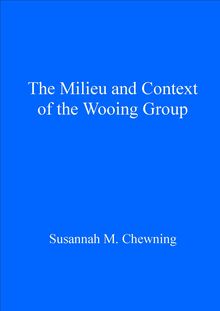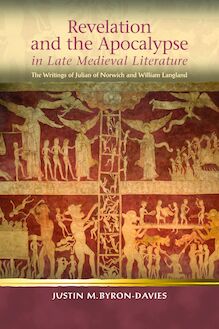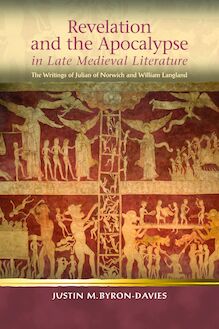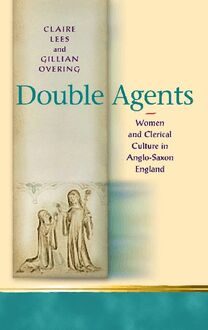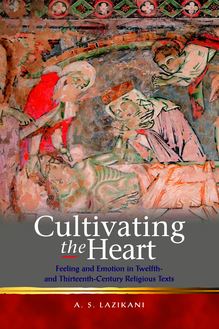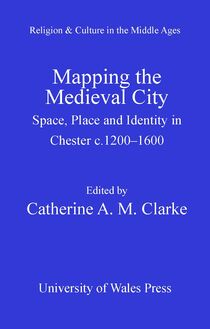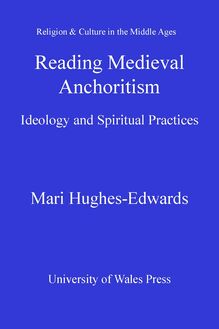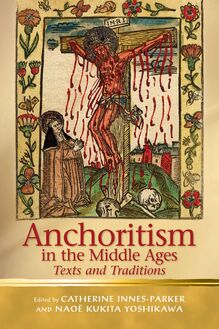-
 Univers
Univers
-
 Ebooks
Ebooks
-
 Livres audio
Livres audio
-
 Presse
Presse
-
 Podcasts
Podcasts
-
 BD
BD
-
 Documents
Documents
-
- Cours
- Révisions
- Ressources pédagogiques
- Sciences de l’éducation
- Manuels scolaires
- Langues
- Travaux de classe
- Annales de BEP
- Etudes supérieures
- Maternelle et primaire
- Fiches de lecture
- Orientation scolaire
- Méthodologie
- Corrigés de devoir
- Annales d’examens et concours
- Annales du bac
- Annales du brevet
- Rapports de stage
La lecture à portée de main
Vous pourrez modifier la taille du texte de cet ouvrage
Découvre YouScribe en t'inscrivant gratuitement
Je m'inscrisDécouvre YouScribe en t'inscrivant gratuitement
Je m'inscrisEn savoir plus
Vous pourrez modifier la taille du texte de cet ouvrage
En savoir plus

Description
This book represents the first full-length study of the prevalence of domestic imagery in late medieval religious literature. It examines as yet understudied patterns of household imagery and allegory across four fifteenth-century spiritual texts, all of which are Middle English translations of earlier Latin works. These texts are drawn from a range of popular genres of medieval religious writing, including spiritual guidance texts, Lives of Christ and collections of revelations received by visionary women. All of the texts discussed in this book have identifiable late medieval readers, which further enables a discussion of the way in which these book users might have responded to the domestic images in each one. This is a hugely important area of enquiry, as the literal late medieval household was becoming increasingly culturally important during the fourteenth and fifteenth centuries, and these texts’ frequent recourse to domestic imagery would have been especially pertinent.
Acknowledgments
List of Abbreviations
List of Manuscript Sigla
Prefatory Notes
Introduction
Chapter One: The Kitchen of the Heart, Spiritual Furniture and Noble Visitors: Mapping the Domestic in The Doctrine of the Hert
Chapter Two: The Domesticity of the Sacred Heart in Mechthild of Hackeborn’s Booke of Gostlye Grace
Chapter Three: Marriage, Storehouses and Celestial Visitors: Domestic Frameworks in Bridget of Sweden’s Liber Celestis
Chapter Four: From Wanderer to Householder: The Domestication of Jesus, the Disciples and the Holy Family in Nicholas Love’s Mirror of the Blessed Life of Jesus Christ
Afterword
Notes
Bibliography
Sujets
Informations
| Publié par | University of Wales Press |
| Date de parution | 15 janvier 2022 |
| Nombre de lectures | 0 |
| EAN13 | 9781786838322 |
| Langue | English |
Informations légales : prix de location à la page 0,4400€. Cette information est donnée uniquement à titre indicatif conformément à la législation en vigueur.
Extrait
RELIGION AND CULTURE IN THE MIDDLE AGES
Cushions, Kitchens and Christ
folio 31 r of Warminster, Longleat House, MS 14
RELIGION AND CULTURE IN THE MIDDLE AGES
Cushions, Kitchens and Christ Mapping the Domestic in Late Medieval Religious Writing
LOUISE CAMPION
Series Editors
Denis Renevey (Université de Lausanne)
Diane Watt (University of Surrey)
Editorial Board
Elizabeth L’Estrange (University of Birmingham)
Andrew Kraebel (Trinity University, Texas)
Miri Rubin (Queen Mary University of London)
Laura Saetveit Miles (University of Bergen)
Fiona Somerset (University of Connecticut)
For my aunt, Pauline Ann Bell-Hartley, and my grandmother, Ivonne Gabrielle Ghislaine Campion
© Louise Campion, 2022
All rights reserved. No part of this book may be reproduced in any material form (including photocopying or storing it in any medium by electronic means and whether or not transiently or incidentally to some other use of this publication) without the written permission of the copyright owner except in accordance with the provisions of the Copyright, Designs and Patents Act. Applications for the copyright owner’s written permission to reproduce any part of this publication should be addressed to the University of Wales Press, University Registry, King Edward VII Avenue, Cardiff, CF10 3NS.
www.uwp.co.uk
British Library Cataloguing-in-Publication Data
A catalogue record for this book is available from the British Library.
ISBN 978-1-78683-830-8
eISBN 978-1-78683-832-2
The right of Louise Campion to be identified as author of this work has been asserted in accordance with sections 77 and 79 of the Copyright, Designs and Patents Act 1988.
The publisher has no responsibility for the persistence or accuracy of URLs for any external or third-party internet websites referred to in this book, and does not guarantee that any content on such websites is, or will remain, accurate or appropriate.
C ONTENTS
Series Editors’ Preface
Acknowledgements
List of Illustrations
List of Abbreviations
List of Manuscript Sigla
Prefatory Notes
Introduction
1 The Kitchen of the Heart, Spiritual Furniture and Noble Visitors: Mapping the Domestic in The Doctrine of the Hert
2 The Domesticity of the Sacred Heart in Mechthild of Hackeborn’s Booke of Gostlye Grace
3 Marriage, Storehouses and Celestial Visitors: Domestic Frameworks in Bridget of Sweden’s Liber Celestis
4 From Wanderer to Householder: The Domestication of Jesus, the Disciples and the Holy Family in Nicholas Love’s Mirror of the Blessed Life of Jesus Christ
Afterword
Notes
Bibliography
S ERIES E DITORS’ P REFACE
Religion and Culture in the Middle Ages aims to explore the interface between medieval religion and culture, with as broad an understanding of those terms as possible. It puts to the forefront studies which engage with works that significantly contributed to the shaping of medieval culture. However, it also gives attention to studies dealing with works that reflect and highlight aspects of medieval culture that have been neglected in the past by scholars of the medieval disciplines. For example, devotional works and the practice they infer illuminate our understanding of the medieval subject and its culture in remarkable ways, while studies of the material space designed and inhabited by medieval subjects yield new evidence on the period and the people who shaped it and lived in it. In the larger field of religion and culture, we also want to explore further the roles played by women as authors, readers and owners of books, thereby defining them more precisely as actors in the cultural field. The series as a whole investigates the European Middle Ages, from c .500 to c .1500. Our aim is to explore medieval religion and culture with the tools belonging to such disciplines as, among others, art history, philosophy, theology, history, musicology, the history of medicine, and literature. In particular, we would like to promote interdisciplinary studies, as we believe strongly that our modern understanding of the term applies fascinatingly well to a cultural period marked by a less tight confinement and categorization of its disciplines than the modern period. However, our only criterion is academic excellence, with the belief that the use of a large diversity of critical tools and theoretical approaches enables a deeper understanding of medieval culture. We want the series to reflect this diversity, as we believe that, as a collection of outstanding contributions, it offers a more subtle representation of a period that is marked by paradoxes and contradictions and which necessarily reflects diversity and difference, however difficult it may sometimes have proved for medieval culture to accept these notions.
A CKNOWLEDGEMENTS
This book would not exist without the support of several different individuals and institutions. It began life as a doctoral thesis, and my research was made possible by a scholarship from the Centre for Arts Doctoral Research Excellence at the University of Warwick, for which I remain very grateful. I would like to thank my former supervisor, Christiania Whitehead, for her constant encouragement and careful readings of my work, as well as her unstinting readiness to discuss my ideas. I have benefited hugely from the guidance and friendship of the broader community of medievalists at Warwick, especially Emma Campbell, Marco Nievergelt and Sarah Wood. I am also very grateful to my former Head of Department, Emma Mason, for kindly agreeing to discuss my work with me on more than one occasion. I should also like to thank the staff and research community at Warwick’s Institute of Advanced Study, where I held a Postdoctoral Fellowship, for giving me such a stimulating environment in which to begin the process of revising my thesis into this book.
Beyond Warwick, I owe a debt of gratitude to Anne Mouron and Naoë Kukita Yoshikawa, who very generously agreed to share and discuss their work on Mechthild of Hackeborn with me. I also received very valuable advice and support from the annual Research Days in Medieval English Studies, organised by the Universities of Péter Pázmány, Budapest, Lausanne, Padua and Warwick, by Tamás Karáth, Denis Renevey and Alessandra Petrina. I am grateful to the organisers for always including me, and to Catherine Batt, Ian Johnson and Diane Watt, who gave me excellent suggestions for further research at these events. At the University of Wales Press, Sarah Lewis has been an incredibly patient and responsive editor, and I am also very thankful to the anonymous reader of this book for their generous and insightful comments.
I owe a huge debt of gratitude to my friends and family, whose love and support has been invaluable. Particular thanks go to Jane Sinnett-Smith, Merryn Everitt, Raphaela Rohrhofer, Elena Roberts, Michelle Riley, Eric Feng, Jethro Waldron, Emily Dubois and Stephanie Kline. I met Liam Lewis very briefly during my undergraduate studies, and then again when we began our doctoral research at the same time, in September 2015. Since then, he has been my reader, critic and counsellor, and I will be forever grateful for his unwavering friendship. My aunt and uncle, Nicole and Steve, have taken a keen interest in this book from the very beginning, as well as offering frequent practical support. During long days at the library, my brother, John, often took time out of his day to listen to my ideas or anxieties about my work. I am also endlessly grateful to my sister, Catherine, and brother-in-law, Richard, for their constant support, advice, and, when needed, distraction from my work. My nieces, Emily, Lucy and Katie, and nephew, Ben, are not at all interested in medieval literature, and often make this known, but they are, without doubt, my greatest source of inspiration. I owe more than words can say to my parents, David and Elizabeth; I am not sure that anything I could write would do justice to their unceasing love, patience, support and encouragement.
This book is for my grandmother, Ivonne, who, when I first started this research, would often ask me ‘what is the point of this?’ This is, I have come to realise, an excellent and entirely reasonable question. It is also for my aunt, Pauline, who was the most extraordinary woman I have ever known. I dearly wish that they were both still here to hold this book in their hands, and hope that they would be very proud to see it complete.
L IST OF I LLUSTRATIONS
Frontispiece folio 31 r of Warminster, Longleat House, MS 14
L IST OF A BBREVIATIONS
Ancrene Wisse Bella Millett (ed.), Ancrene Wisse: A Corrected Edition of the Text in Cambridge, Corpus Christi College, MS 402, with Variants from Other Manuscripts , EETS O. S. 325 (Oxford: Oxford University Press, 2005), I
Booke Mechthild of Hackeborn, The Booke of Gostlye Grace of Mechtild of Hackeborn , ed. Theresa A. Halligan (Toronto: Pontifical Institute of Medieval Studies, 1979)
CCCM Corpus christianorum, continuatio medievalis
CCSL Corpus christianorum, series latina
De doctrina Speculum concionatorum, ad illustrandum pectora auditorum, in septem libros distributum , Auctore F. Gerardo Leodiensi, Ordinis Fr. Praedicatorum Lectore celleberrimo, 2nd edn (Naples: Baptistæ Subtilis, 1607)
Doctrine Christiania Whitehead, Denis Renevey and Anne E. Mouron (eds), The Doctrine of the Hert: A Critical Edition with Introduction and Commentary (Exeter: University of Exeter Press, 2010)
EETS Early English Text Society
E. S. Extra Series
O. S. Original Series
Liber Bridget of Sweden, The Liber Celestis of St Bridget of Sweden , ed. Roger Ellis, EETS O. S. 291 (Oxford: Oxford University Press, 1987)
Liber SG Mechthild of Hackeborn, Revelationes Gertrudianae ac Mechtildianae: Sanctae Mechtildis virginis ordinis Sancti Benedicti Liber specialis gratiae; accredit sororis Mechtildis ejusdem ordinis Lux divinitatis , ed. Dom. Paquelin and the monks of Solesmes (Paris: Oudin Fratre
-
 Univers
Univers
-
 Ebooks
Ebooks
-
 Livres audio
Livres audio
-
 Presse
Presse
-
 Podcasts
Podcasts
-
 BD
BD
-
 Documents
Documents
-
Jeunesse
-
Littérature
-
Ressources professionnelles
-
Santé et bien-être
-
Savoirs
-
Education
-
Loisirs et hobbies
-
Art, musique et cinéma
-
Actualité et débat de société
-
Jeunesse
-
Littérature
-
Ressources professionnelles
-
Santé et bien-être
-
Savoirs
-
Education
-
Loisirs et hobbies
-
Art, musique et cinéma
-
Actualité et débat de société
-
Actualités
-
Lifestyle
-
Presse jeunesse
-
Presse professionnelle
-
Pratique
-
Presse sportive
-
Presse internationale
-
Culture & Médias
-
Action et Aventures
-
Science-fiction et Fantasy
-
Société
-
Jeunesse
-
Littérature
-
Ressources professionnelles
-
Santé et bien-être
-
Savoirs
-
Education
-
Loisirs et hobbies
-
Art, musique et cinéma
-
Actualité et débat de société
- Cours
- Révisions
- Ressources pédagogiques
- Sciences de l’éducation
- Manuels scolaires
- Langues
- Travaux de classe
- Annales de BEP
- Etudes supérieures
- Maternelle et primaire
- Fiches de lecture
- Orientation scolaire
- Méthodologie
- Corrigés de devoir
- Annales d’examens et concours
- Annales du bac
- Annales du brevet
- Rapports de stage
